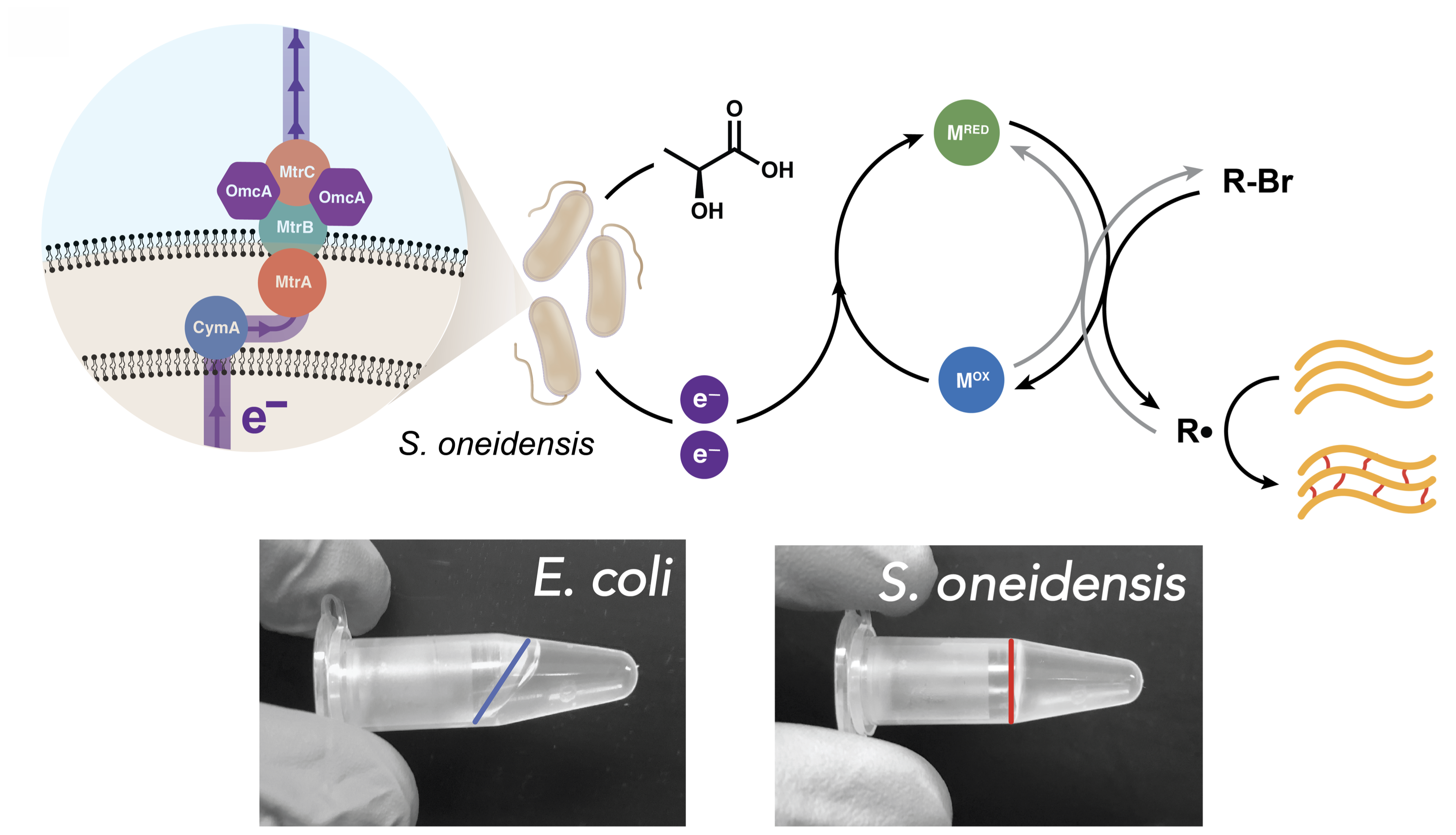(429e) Rewiring Bacterial Electron Transfer for Living Materials Synthesis
AIChE Annual Meeting
2020
2020 Virtual AIChE Annual Meeting
Food, Pharmaceutical & Bioengineering Division
Novel Applications in Synthetic Biology
Wednesday, November 18, 2020 - 9:00am to 9:15am
Austin J. Graham1,2, Christopher M. Dundas1, Gina Partipilo1, Thomas M. FitzSimons1,2, Adrianne M. Rosales1,2, Benjamin K. Keitz1,2
1McKetta Department of Chemical Engineering, University of Texas at Austin, Austin, TX
2Center for the Dynamics and Control of Materials, University of Texas at Austin, Austin, TX
Qualities exhibited by living systems, including self-regulation, self-healing, morphology control, and environmental responsiveness, are highly attractive from a material design perspective. However, traditional biological materials such as biofilms and tissues are generally less robust and more difficult to engineer than synthetic materials. New materials should aim to bridge the characteristics of natural and synthetic systems; however, they will require programming of genetic and transcriptional responses whose outputs can control non-biological material properties. Towards these goals, engineered living materials (ELMs) are a class of materials defined by their incorporation of autonomous cells that use biological functions to control material properties. Our group recently demonstrated that extracellular electron transfer (EET) from the organism Shewanella oneidensis can be leveraged to control the redox equilibrium of metal catalysts to synthesize polymers and polymers networks via atom-transfer radical polymerization1,2. Using this method, we report the production of hydrogel ELMs in which S. oneidensis MR-1 controls the cross-linking of methacrylated hyaluronic acid. Cross-linking by genetic knockouts demonstrated that hydrogel formation was closely coupled to the expression of specific EET proteins, as gelation kinetics and stiffness correlated to the number of removed EET genes. Furthermore, strains complemented with an inducible EET gene showed inducer-dependent cross-linking activity and hydrogel mechanics, including both gel microstructure and bulk properties. Modeling gene expression using an activating Hill Function yielded quantitative prediction of hydrogel storage modulus, demonstrating control over material properties using design principles from synthetic biology. Genetic circuits controlling different EET genes also yielded tunable networks with unique properties depending on the choice of gene. By coupling EET activity to cross-link density, we have engineered a platform that utilizes endogenous bacterial metabolism to control and evolve macroscopic materials in response to environmental cues. Next, we will further demonstrate the general applicability of EET-controlled catalysis for living material synthesis, cross-linking fully synthetic polymer networks using thiol-ene and CuAAC click chemistries. Genetic control over these chemistries will significantly expand the synthetic capability of microorganisms. Finally, these gels will be employed in an extrusion printing setup for injectable applications such as soil stabilization and engineered plant ecology.
- A.J. Graham, C.M. Dundas, A. Hillsley, D.K. Kasprak, A.M. Rosales, B.K. Keitz. “Genetic Control of Radical Cross-linking in a Semisynthetic Hydrogel.†ACS Biomater. Sci. Eng. 6(3): 1375-1386 (2020).
- G. Fan, A.J. Graham, J. Kolli, N.A. Lynd, B.K. Keitz. “Aerobic Radical Polymerization Mediated by Microbial Metabolism.†Nat. Chem. (in press, 2020).
Topics
Checkout
This paper has an Extended Abstract file available; you must purchase the conference proceedings to access it.
Do you already own this?
Log In for instructions on accessing this content.
Pricing
Individuals
| AIChE Pro Members | $150.00 |
| AIChE Emeritus Members | $105.00 |
| AIChE Graduate Student Members | Free |
| AIChE Undergraduate Student Members | Free |
| AIChE Explorer Members | $225.00 |
| Non-Members | $225.00 |

